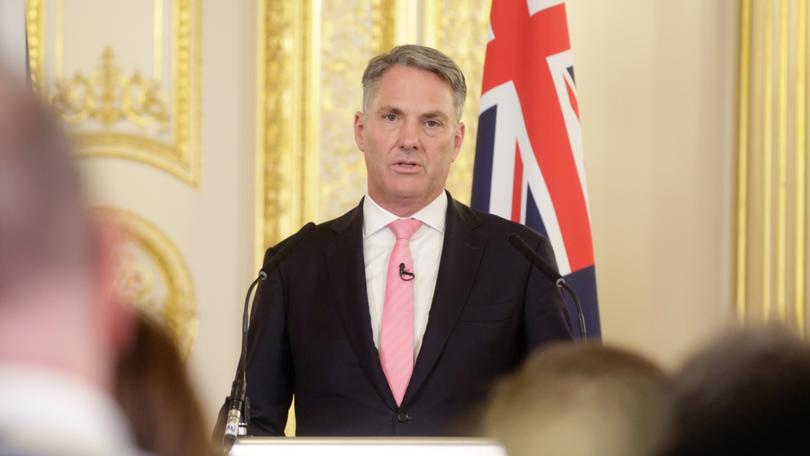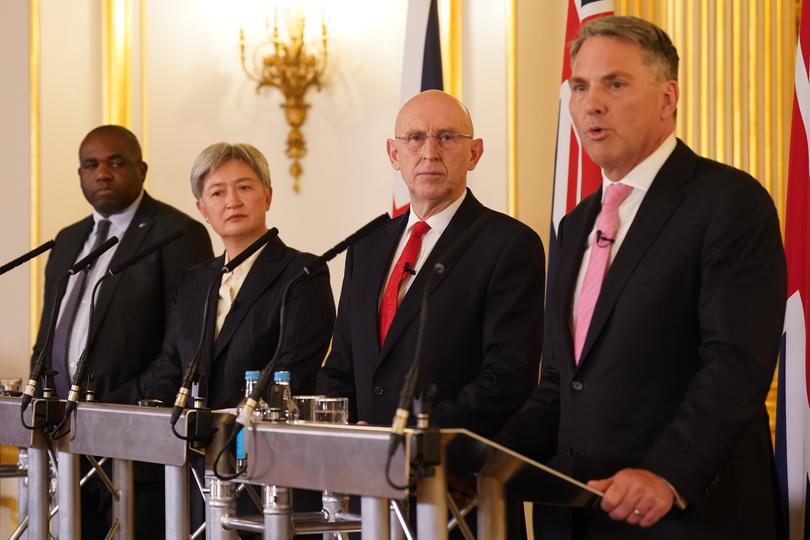Richard Marles doesn’t rule out Aussie troops in Ukraine to secure peace
Deputy Prime Minister Richard Marles has left open the possibility of Australian troops being sent to Ukraine to help secure the country as part of any peace deal.

Deputy Prime Minister Richard Marles has left open the possibility of Australian troops being sent to Ukraine to help secure the country as part of any peace deal.
It follows the call by Estonia’s Foreign Minister Margus Tsahkna who said in an interview with The Nightly that non-NATO partners including Australia could help keep Ukraine safe from further Russian attacks.
Mr Marles was asked about the proposal at a joint press conference in London after the annual AUKMIN talks involving the UK and Australia’s foreign and defence ministers at Lancaster House.
Sign up to The Nightly's newsletters.
Get the first look at the digital newspaper, curated daily stories and breaking headlines delivered to your inbox.
By continuing you agree to our Terms and Privacy Policy.He hinted that Australia would be guided by the British.
“We spoke a lot about what we can continue to provide in support during the course of 2025,” he said.
“But we will continue to look at ways in which we can support Ukraine for as long as it takes and we work really closely with the UK in terms of what that commitment looks like.
“And we have greatly appreciated Britain’s leadership in the way in which it has convened support amongst countries around the world including Australia for Ukraine.
“And we’ll continue to work with Britain in terms of what support we can continue to provide.”

Estonia is one of a handful of countries urging a discussion about how to keep Ukraine safe, if it is forced to the negotiating table by the incoming Trump Administration.
The UK’s Defence Secretary John Healey said it was important to focus on supporting Ukraine in its fight against Russia but did not rule out the idea either.
“It’s important not to get ahead of ourselves,” he said.
“Our task and our duty is to support Ukraine in every way that we can resist the Russian offensive, to hold and retake its ground and to put itself in the strongest possible position if President Zelensky decides to start talking, instead of fighting.
“When that moment comes, our job as allied nations that stand steadfast with Ukraine is to support them in any negotiations, just as we will through battlefield fighting.”
How to secure Ukraine, while it waits for admission to NATO, which Germany and the United States oppose, is set to dominate talks in Brussels on Wednesday when Ukrainian President Volodymyr Zelensky meets with European leaders.
On Tuesday, Foreign Minister Penny Wong will be in Brussels to meet the new NATO boss Mark Rutte.
The idea of sending Western troops to Ukraine is controversial even within Europe.
French President Emmanuel Macron has floated the idea but his ability to lead Europe is weakened following the collapse of his government and collapse in support for his centrist movement at the snap election he called earlier this year.
The other European powerhouse, Germany, is opposed but its centre-left Prime Minister Olaf Scholz is also in crisis, having lost a confidence vote in the Bundestag on Monday paving the way for elections in the new year.
And Poland, whilst the biggest spender on defence in NATO, is also opposed.
But Estonia’s Foreign Minister Margus Tsahkna, along with his Baltic counterparts, argue that unless security guarantees for Ukraine are backed up with force, history will repeat itself and Russia will invade again, leading to more bloodshed.
He also said that the entry of North Korean troops onto the battlefield showed that securing Ukraine was in the interests of the Indo-Pacific.
Australia joined the UK, United States, Canada, France, Germany, Italy, Japan, Korea, New Zealand and the High Representative of the European Union in issuing a statement condemning North Korea’s involvement.
“Direct DPRK support for Russia’s war of aggression against Ukraine marks a dangerous expansion of the conflict, with serious consequences for European and Indo-Pacific security,” that statement said.
“We are deeply concerned about any political, military, or economic support that Russia may be providing to the DPRK’s illegal weapons programs, including weapons of mass destruction and their means of delivery, which would exacerbate the already tense environment on the Korean peninsula.
“We encourage members of the broader international community to join our call and we will continue to act in concert, including through imposition of economic sanctions, to respond to the danger posed by the DPRK-Russia partnership.”

